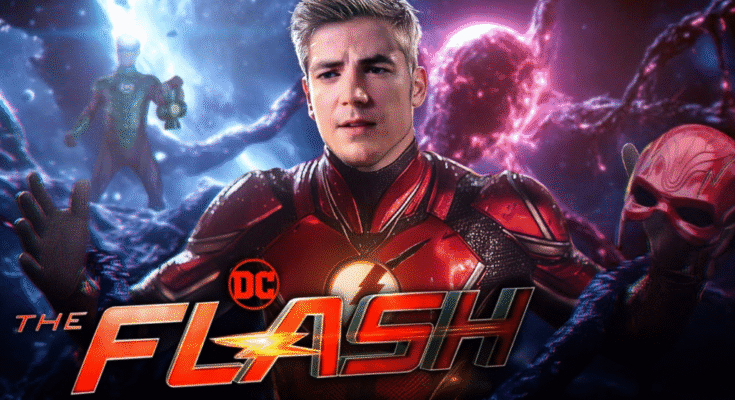Time bends. Realities fracture. And the man who runs faster than light is suddenly outrunning more than just villains — he’s chasing the ghosts of who he could’ve been. In The Flash (2025), DC’s scarlet speedster rockets into a bold new era, with Grant Gustin donning the crimson cowl for his cinematic debut — a long-awaited moment that fans of the CW’s series and comic readers alike have been craving.
Set in a post-Crisis continuity where timelines no longer obey the laws they once did, this film is more than a superhero flick — it’s a time-twisting character study wrapped in lightning. Gustin’s Barry Allen is older, wiser, and far more wounded than when we last saw him. He’s a hero shaped by loss, guilt, and a growing realization: saving the world sometimes means sacrificing the parts of yourself you hold most dear.
Enter Jensen Ackles as Hunter Zolomon, aka Zoom — a masterstroke of casting. Ackles brings terrifying weight to the role, portraying a broken speedster from an alternate Earth where Barry never became a hero. Instead, it was Zolomon who took on the mantle — and fell from grace. Now, twisted by pain and obsessed with reshaping reality in his own image, he blames Barry for every world that spun off without justice.

Their clash isn’t just a race; it’s a philosophical collision. One believes tragedy creates heroes. The other believes it just creates victims with speed. The tension is electric — not just in the CGI-charged battles, but in the emotional reckoning between them. When Barry looks at Zoom, he sees the monster he could’ve become.
The multiverse plays a central role, but it’s never overwhelming. We glimpse alternate timelines and familiar faces in unexpected forms — a grizzled Batman with a secret (rumored cameo: Jeffrey Dean Morgan?), a Green Lantern who never left Earth, and even a haunting vision of Barry’s mother still alive. Each universe adds depth, not confusion, sharpening Barry’s emotional stakes rather than diluting them.
Director Andy Muschietti returns with a more mature, focused tone than 2023’s The Flash. Gone are the overcooked gags and inconsistent tone — in their place: tight pacing, moody cinematography, and a reverence for Flash mythology that finally feels earned. The visuals are stunning but purposeful, especially in how the Speed Force is rendered: not just blue lightning, but a fluid, pulsating dimension of memory, regret, and raw power.

The heart of the film is Barry’s inner conflict — his temptation to rewrite history, to save his mother again, to undo everything. But this time, the story doesn’t hinge on a naïve mistake. It’s about maturity. Can Barry truly accept that some pain must remain for growth to happen?
The final showdown between Flash and Zoom — set across collapsing universes stitched together by unstable Speed Force threads — is both breathtaking and brutal. The emotional toll hits hard, but the payoff is worth it. In the end, Barry learns that being a hero isn’t about changing the past — it’s about honoring it, then running forward anyway.
Key Highlights:
- Grant Gustin delivers a layered, grounded performance that redefines Barry Allen for the big screen.
- Jensen Ackles is terrifying and tragic as Zoom, easily one of DC’s most compelling villains.
- Subtle multiverse cameos enrich the story without derailing the focus.
- The film balances intense action with introspection, pushing Barry toward real, lasting growth.
- A shocking mid-credits stinger hints at a wider Speed Force War arc, teasing characters like Max Mercury and Bart Allen.

⭐ Final Verdict: 9/10
A sleek, soulful reset for The Flash on film — emotionally charged, narratively rich, and bolted with fan-fueled energy. This isn’t just a redemption for Barry Allen. It’s a redemption for the character’s cinematic future.

